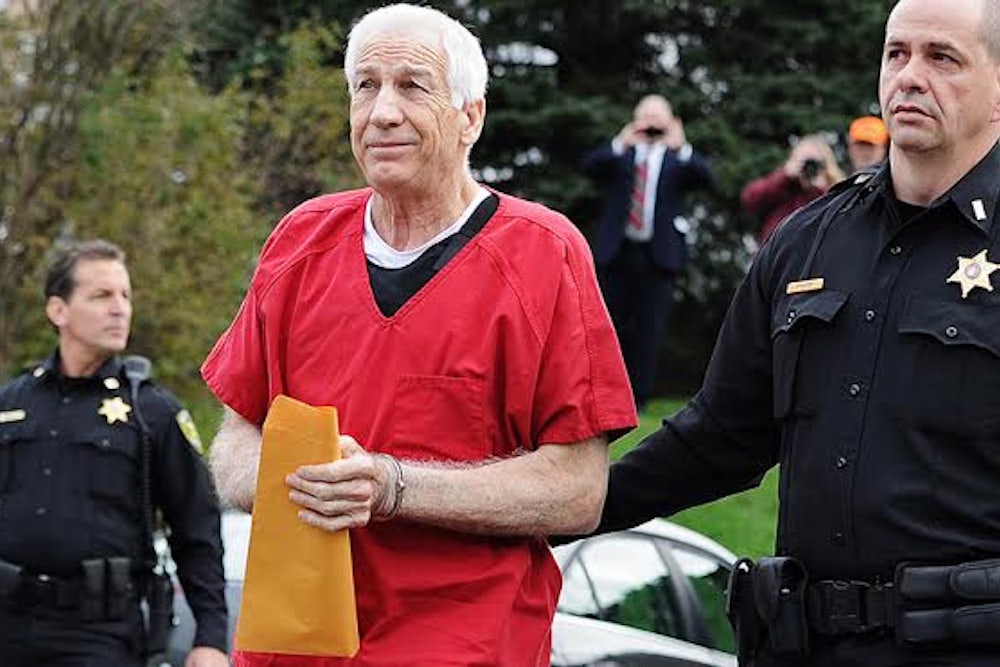In August 2012, the head of the world’s largest public relations firm, Edelman, made a pitch to Penn State University’s Board of Trustees to take on one of the biggest p.r. jobs in recent history: resurrecting the university’s image in the wake of the sex abuse scandal involving former assistant football coach Jerry Sandusky.
“We will visit national media, stories on first anniversaries we have to shape,” said Richard Edelman. “Stand up specific set of allies-those people always called by NYT, CNN, etc. e.g. Sonnenfeld re governance. Then when he goes on TV he'll say good things about Penn State.”
Edelman got the job. And lo and behold, last week USA Today ran an op-ed by Jeffrey Sonnenfeld, senior associate dean at the Yale School of Management, a frequent TV commentator on corporate governance, and a college classmate and friend of Edelman’s, under the headline: “Penn State deserves great praise.” The column overflows with plaudits for the university leadership’s attempts to rebuild after the Sandusky scandal:
But rather than fight [NCAA sanctions] as many alumni demanded, the Penn State board switched. The board examined the facts, and saw the failures of oversight and inadequate protection of children. They faced a classic recovery dilemma, and courageously made the right choice…
One of the first, and most important, steps on this path was the appointment Rodney Erickson, a 30-year veteran of the university and its former provost, to step in to fill the leadership void of the ousted predecessor Graham Spanier. In short, they hired a Jimmy Stewart-like pillar of integrity and responsibility…
…The board wisely drew on its reservoir of internal talent as well, asking board member and Merck CEO Kenneth Frazier to chair Penn State's special investigation committee. Frazier is not only a revered CEO but also was the general counsel of Merck who was well battle-tested in public controversy…
Is it really that easy in the world of upper-echelon public relations? Promise a potential client you’ll get a seemingly neutral voice of authority to say nice things about them. Win the contract. Get aforementioned voice of authority to say the nice thing.
Not so, said both Edelman and Sonnenfeld when I reached them Monday afternoon. Sonnenfeld at first denied that Edelman had even been invoking him in 2012 as a potential commentator on Penn State; rather, he said, Edelman had been suggesting him as a paid consultant to the trustees, an overture Sonnenfeld says he later received from the university and declined. But I read back to him Edelman’s pitch, which clearly offers up Sonnenfeld as a possible source of positive public commentary on Penn State. Did the USA Today column simply represent the fulfillment of that pitch?
No way, says Sonnenfeld. He said he conceived of doing a column on Penn State at the suggestion of William E. "Brit" Kirwan, the chancellor of the University System of Maryland, after the two men had been discussing Penn State at a meeting last fall of the National Commission on College and University Governance. Yes, Sonnenfeld said, he and Edelman are old friends (they attended Harvard College and Harvard Business School together and Edelman’s firm is also a partner in the Yale Chief Executive Leadership Institute run by Sonnenfeld), but Sonnenfeld noted occasions when he has tweaked Edelman’s clients, such as Samsung and Chesapeake Energy and its former CEO, Aubrey McClendon. “I don’t do that sort of work,” Sonnenfeld told me. “I didn’t author anything as an agent for anybody. I have a portfolio of friends across the spectrum, but they don’t have anything to do with dictating what I write.” Had Edelman contacted him encouraging him to offer positive commentary on Penn State? “I might have discussed it with him,” he said. “I’m not going to definitively say I didn’t have a conversation with him. But this was independent.”
Edelman, for his part, freely acknowledged having reached out to Sonnenfeld about Penn State, but said it was done not to spur him to write the column but simply to give Penn State’s account of its post-Sandusky moves in order to inform any future commentary on Penn State Sonnenfeld might offer. “What I was describing [to the trustees] was a classic p.r. technique, which is you find experts in a field and then you brief the experts and you hope that when national media calls them that they [are positive],” Edelman told me. “You go to the Delphic oracles and get them to evaluate your side of the story in event that they are called…Jeff was among the experts we went to visit with in the wake of being hired.” But Sonnendfeld's column was no plant by Edelman, he said. "He writes his own stuff,” he said. “This is a public relations plan that we executed for Penn State, but he has his own opinions and is capable of articulating them….Jeff is a character and has his own integrity and will write whatever he believes.”
So there you have it: a little window into the world of high-stakes image-shaping, an endeavor that has become as big a preoccupation in the higher education realm as it has long been in the corporate one. Penn State badly needed a reputation upgrade. In the pages of one of the nation’s biggest newspapers, an executive from another university gave that upgrade a big boost. There was a background to that glowing column that, at the very least, put the praise in a different perspective. But readers (or at least those outside the “portfolio of friends”) wouldn’t have known that.
Caveat lector, and caveat TV observator.
